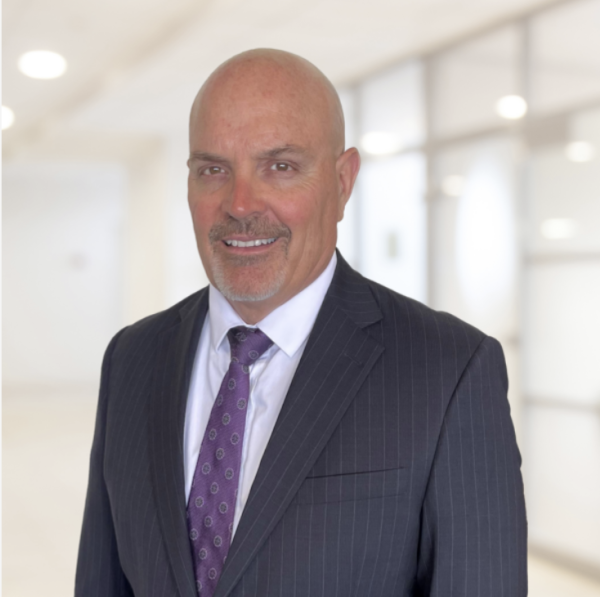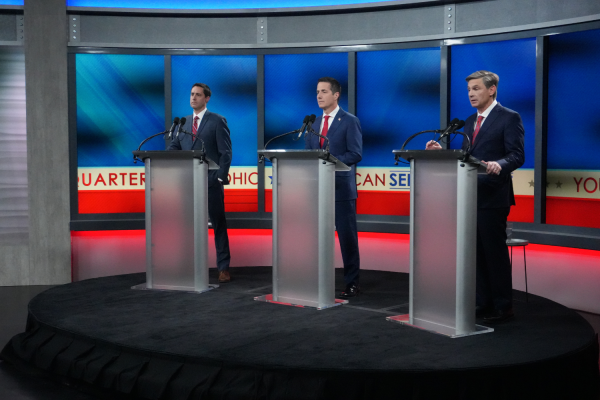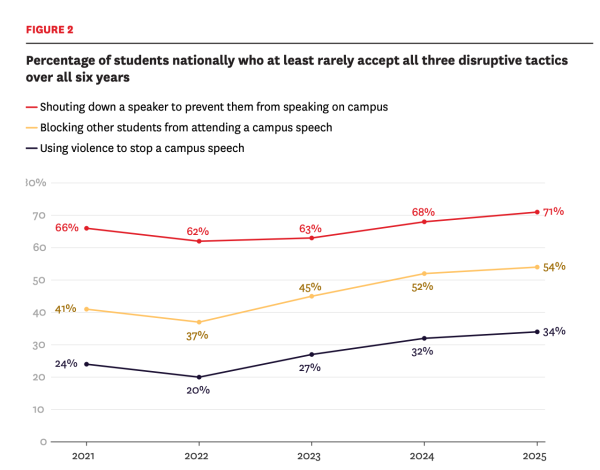Cuyahoga County executive candidates face off in debate over future of county’s economy
With a county budget nearing $1.5 billion, the candidates’ plans for spending and taxation were a focal point of the debate.
In a debate hosted by the City Club of Cleveland on Sept. 20, the two candidates for Cuyahoga County executive, Democrat Chris Ronayne and Republican Lee Weingart, battled over questions received from the community prior to the event and highlighted their diverging approaches to handling county finances.
Starting the debate, each candidate gave a 90-second opening statement and put focus on the economy. Weingart said he plans to overhaul the county’s income tax whereas Ronayne addressed the problem of economic inequality in Cuyahoga County.
“We know the disparities that face us,” Ronayne said. “Too often, our zip code is the determinant of our outcome and our longevity.”
Both candidates received applause after giving varying accounts of how to handle the Cuyahoga County jail. Since 2018, county leaders have debated whether to renovate the existing facility or build a new jail.
Ronayne said that he plans to renovate the jail while also considering sites for a new facility. However, Ronayne said he does not only want a jail, but a justice system.
“My goal is to bring down the prison population,” Ronayne said. “My goal is to rehabilitate and stabilize communities.”
Weingart said he wants to build smaller jails and provide more diversion and treatment for non-violent inmates.
Weingart said that since the start, he has not wanted to build a new jail and will try his hardest to follow through with that goal, referencing a recent County estimate that projects a jump from the previously-anticipated construction costs for a potential new facility.
“I opposed this new jail from the very beginning,” Weingart said. “It was $500 million and now it’s $750 million”.
A cornerstone of Weingart’s campaign, his proposed tax plan includes a freeze on property taxes for senior citizens and a new countywide municipality that would collect a unified income tax, shutting down the Regional Income Tax Agency.
Under the current system, all 57 municipalities can each set their own income tax rate.
With the rise of remote work during the Covid-19 pandemic, RITA has included requests for tax refunds on income earned out of homes located in a different municipality from their workplace. With a levied unified income tax, Weingart said some cities will not be losing money.
“They’re losing money because of remote work,” said Weingart. “[The unified income tax] makes our county more competitive. No longer will cities be competing against each other to bring in jobs.”
Ronayne proposed a Community Health Equity Fund that would be funded by a voluntary property tax on hospitals which currently do not pay property taxes. Ronayne said it would be a 35% rate that could bring in $38 million for infrastructure, parks, and schools.
“There is $114 million of taxable land on the table that is not being taxed now,” Ronayne said. “As the industry grows, so grows our need to have some recaptured to support schools, to support parks, and infrastructure.”
Weingart said that while he believes it is important to close healthcare disparities, it should not be done through discretionary spending by the county, citing what he views as a poor track record related to discretionary spending of Covid-19 stimulus money. Weingart said he would rather work directly with the hospitals.
“We saw what happened the last time we gave discretionary funds to the County Council,” said Weingart. “$66 million in illegal spending – what I see as illegal spending. It’s not a good idea.”
At the time of the proposed spending of the Covid-19 stimulus money, Weingart had asked the County Prosecutors to block the proposal that included a wide variety of spending plans such as a golf course clubhouse, arts and economic development.
The current executive, Democrat Armond Buddish, has held the seat since 2015. The position was created 12 years ago following the corruption scandal involving the former Cuyahoga County Commissioner Jimmy Dimora.
While both candidates have spent the last several years working public-facing jobs in the private sector, they have both previously held positions within the county government.
Weingart, who served as County Commissioner from 1995 until 1997, has been running a lobbying firm since 2002.
Ronayne, starting his career as a public servant, was in the County Planning Commission before becoming the City of Cleveland’s Planning Director until most recently serving as the president of University Circle Inc.
The Exponent is looking for financial contributions to support our staff and our newsroom in producing high-quality, well-reported and accurate journalism. Thank you for taking the time to consider supporting our student journalists.




































